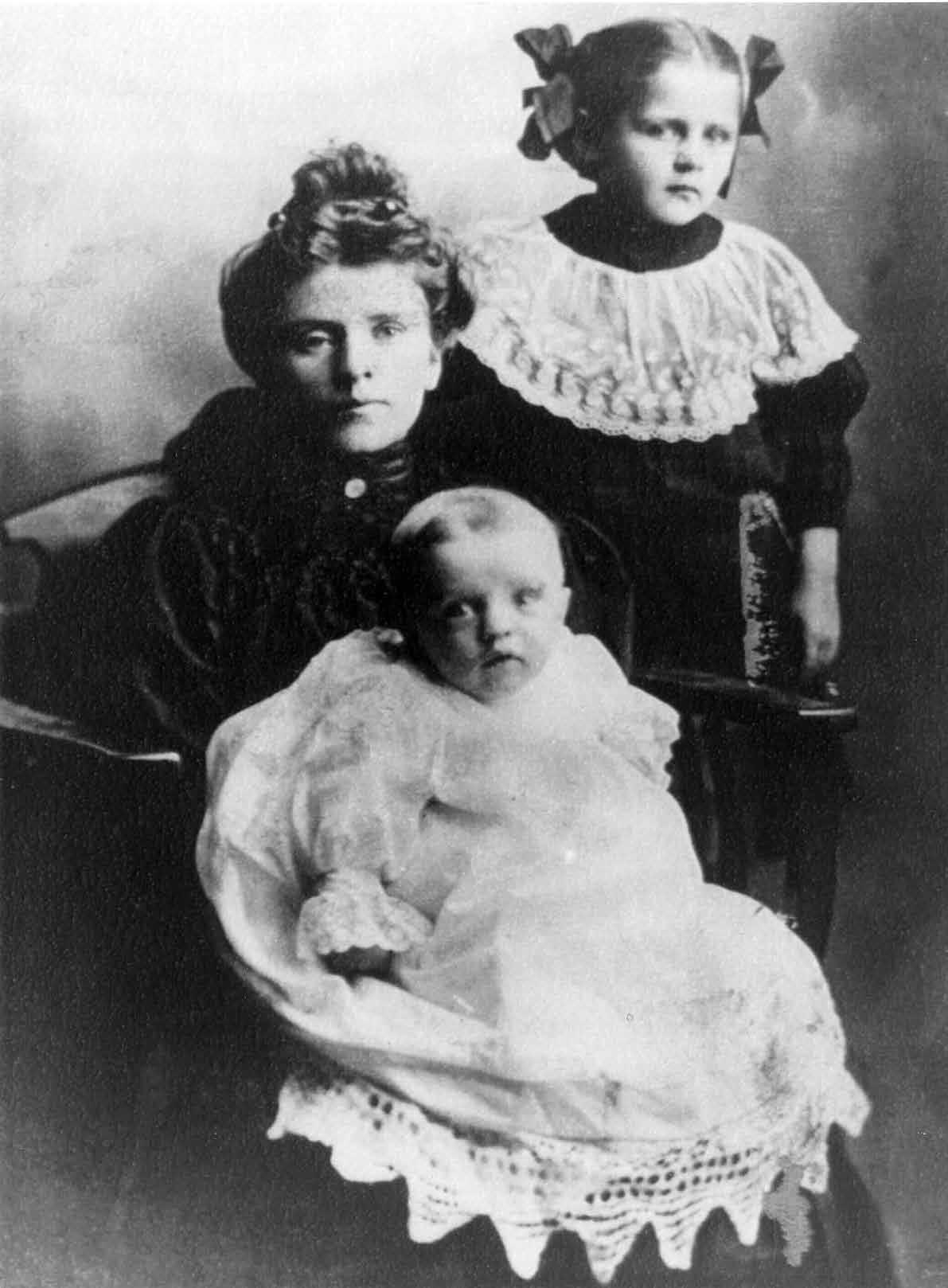
6 minute read
Endangered Species
By Jennifer Strange

Killdeer Fire Department volunteers in front of Wetsch Bros. Red & White Store, 1939. Left to right: Lawrence Malmstad, Senster Anderson, Manley Malmstad, Arba Lawhead, Ed Oukrop, Earl David, Fire Chief Anton Wetsch Sr., Jack Jesty, Jim Olijnyk. (Photo courtesy of Dunn County Historical Society & Museum).
Advertisement
The produce aisle at Hinrich’s SuperValu—Killdeer’s rundown and overrun grocery store—is ripe for socializing. Today I’m visiting with Verna Wolf, a sixty-something transplant from Minnesota whose family tree is rooted in Bohemia. She moved here in 1967, the year I was born, and is one of a handful of people I’ve met on the Western Edge whom I would call a trusted friend. Both wise and naïve, Verna usually prefers to go along to get along—it’s called “North Dakota Nice”—but every once in a while she’ll say her mind about politics, about greed, about prejudice, about the paradox of despairing the oil industry while benefiting from its financial opportunities.
Verna’s yellow V-neck flatters her blue eyes, and her short, gray-and-brown hair bobs with a fresh perm. She clutches a bag of spring greens, eagle-eyes its list of ingredients. “I’m trying a new recipe tonight—a salad with peaches and basil and walnuts,” she says. Satisfied with what she’s read, she puts the greens in her cart. “Not that Rodney will eat it; he just doesn’t like to eat at all.”
We’ve chatted about this before. I’ve suggested she’s kind of lucky that cooking isn’t her thing and that her husband doesn’t much care for food. “Keeps you nice and slim,” I’ve said, patting my ample belly.
I’m wondering if we’ll go down this beaten conversational path when Tony Wetsch announces himself. Spry and wiry, he leans hard toward ninety. He sports dirty workman’s jeans, a plaid shirt with metal snaps for buttons, and thin hair combed stiffly to the right. One hand grips a giant, red plastic mesh bag of yellow onions.
“Verna!” he says. The bag of onions swings our way. “How’s Rodney?”
“Oh, yah, Rodney’s fine,” says Verna. She smiles and nods at Tony then nods in my direction. “Tony, this is Jennifer Strange. I met her last year at the museum.”
Tony and I move to shake hands. I feel callouses against my plump palm.
“Call me Tony Baloney!” he says with an exclamation point. “Or Tony the Bloody Butcher!”
Tony is tickled to have an audience for his prickly tirade: The wife has left him to his own devices, gone to visit family in Wisconsin. He’s got hunting pals coming in for deer season opener and plans to feed them some “tiger meat.”
I squint a question mark at Verna. She picks right up on my culinary curiosity. “Tony,” she says, “tell Jennifer what tiger meat is.”
Tony is giddy to oblige. His shoulders square and his skeleton grows an inch or two—he owns the authority that this rural ranching community has bestowed upon its oldest living butcher. He looks right at me. “Serious business,” Tony says.
I do not argue.
“First,” he says, “you use the leanest, best ground beef you can buy. Do you understand? Not the cheap stuff. Lean. Chop up your onions real fine then mix ‘em in. With your hands. Add your spices. Lots of garlic powder. And my secret ingredient …”—his voice becomes a dramatic whisper—“… just a pinch of MSG.”
Tony fixes me with a daring stare. He’s reached his crescendo: “You eat it with lots of beer!” he bellows. “Makes you real horny!”
Then he cackles and does a little shuffle right there between the deli wraps and my grocery cart.
I can’t help it—I blush hard. I look weakly at Verna. She’s either used to such language in front of the packaged lettuce or is practicing selective hearing. “You put it on those square white crackers,” she offers.
“You mean it’s raw?” I ask, testing the acorn squashes to my right for firmness. “And you eat it with saltines?”
“Yah, sure, that’s right,” says Verna, curls bouncing. “Saltines.”
Tony swings his onions back into the fray. “It’s men’s food! Eat it while we’re hunting!”
By this time, we’ve completely bottlenecked the produce aisle. Other shoppers push their carts around the pumpkin display, necks craning, ears cocked.
Fine, I think. There’s no way I’m going to wilt in front of this guy. After all, I’ve tended bar in Deadwood, South Dakota, during the Sturgis Motorcycle Rally.
“Sure sounds like everyone’s going to have a real good time, Tony,” I say. I turn innocently to Verna. “Verna, does Rodney like tiger meat?” (Rodney is rather straight-laced.)
“Oh, yah, sure!” says Verna, all sweetness and nods.
Never before has Tony heard such good news. His arms practically part wide; he is the Wizard of Oz. “Well, send him over tomorrow and I’ll give him half a pound!” he declares.
A moment of silence drops over our trio like the closing curtain at a play. Tony’s sun-wrinkled face slackens. He lifts the onions up and down, up and down, weighing his options. I barely hear him mutter: “Hmmm. Making nine, ten pounds. Beef costs four, five bucks a pound. Onions sixty cents a pound. So the more onions you add, the more money you make.”
Is Tony planning to sell this stuff?
He’s still calculating when he eyes Verna. “So Rodney likes it then?”
“Oh, yah,” she says, with a wink only I can see. “Don’t worry. He’ll be there tomorrow.”
Tony makes up his mind. “Ok then. Tell him to come by. I’ll give him a little bit.”
So much for the half-pound, I think.

“Killdeer, No. Dak. Largest Primary Shipping Point for Stock in United States.” (Photo and caption by Leo D. Harris, courtesy of Dunn County Historical Society & Museum)
“Lucky for Verna!” I say. “I guess tiger meat’s cheaper than dinner and a movie.”
Splat! My joke hits the floor like a rotten kubocha. Not even a grin. Tony just gives us a little bow of the head then walks off, swinging his onions at the jellies and pickles.
“Oh, I’m so glad you got to meet Tony,” says Verna. “He had the butcher shop behind the Buckskin Saloon. They ran a grocery store—him, his brother and his mother, and his father before that. From Russia. Tony’s the only one left.”
Verna pauses. A memory seems to pass over her. She shivers and pats my hand. “That’s a little taste of what Killdeer used to be.”

Killdeer, 1914 (Photo courtesy of Dunn County Historical Society & Museum)
Killdeer’s old-timers are stepping into the grave exactly as their dusty town is being taken over by Oil Patch roughnecks—people who have no history or real investment in the area past another paycheck. Of course that’s where my husband, Terry, and I fall on the spectrum, too. Despite my Dakota roots, we’re newcomers to the area whose financial future will be largely determined by the continued exploitation of the Bakken’s shale play—and of all the region’s hamlets. Then again, I remind myself, the same is true for lots of Dunn County’s lifelong residents and landowners who have leased their mineral rights to Big Oil.

Wetsch Bros. ad in Killdeer Mt. Roundup Souvenir Program, 1941 (Courtesy of Dunn County Historical Society & Museum)
Verna heads to the checkout line. I inspect a bag of bruised and bruisingly overpriced apples and think of Tony’s tall tales. If I ever want my husband to enjoy the brawny benefits of a Saltine piled high with tiger meat, I figure I’d better move fast … and maybe offer Tony twenty bucks—or at least a bag of onions—for his next batch.
JENNIFER STRANGE is a sixth-generation “Missouri River Rat” whose ancestors founded the Strange Bros. Hide & Fur Co. in Sioux City, Iowa, in 1870. An investigative-turned-narrative journalist, Jennifer has published extensively on the environment and sustainability. She writes for journals and newspapers, produces humanities events, and is executive director of Dunn County Writers, a nonprofit organization of grassroots writers on the










